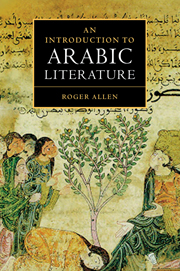Book contents
- Frontmatter
- Contents
- Preface
- Note on translation, transliteration, and further reading
- Chronology
- 1 An essay on precedents and principles
- 2 The contexts of the literary tradition
- 3 The Qurʾān: sacred text and cultural yardstick
- 4 Poetry
- 5 Belletristic prose and narrative
- 6 Drama
- 7 The critical tradition
- Guide to further reading
- Index
5 - Belletristic prose and narrative
Published online by Cambridge University Press: 05 June 2012
- Frontmatter
- Contents
- Preface
- Note on translation, transliteration, and further reading
- Chronology
- 1 An essay on precedents and principles
- 2 The contexts of the literary tradition
- 3 The Qurʾān: sacred text and cultural yardstick
- 4 Poetry
- 5 Belletristic prose and narrative
- 6 Drama
- 7 The critical tradition
- Guide to further reading
- Index
Summary
INTRODUCTION
A regular perusal of book review periodicals such as those published in London and New York provides confirmation of the fact that biography has become a popular, perhaps the most popular, genre among what is often termed the general reading public. The arts of inclusion and omission have ensured that the existence of several biographies of the same prominent personage and the widely divergent pictures that they manage to create provide ready corroboration of our increasing awareness of the linkages between biography and fictional genres. Most particularly, recent research on the fascinating genre of autobiography, that ultimate act of self-arrogation, has served to identify unequivocally the intimate connections between that literary activity and fiction. Varieties of writing in such topics as history, biography, travel, as well as fiction, all come to be viewed as types of ‘narrative’, thereby sharing a number of structural and aesthetic features but differentiated by the contract that they establish with the reader, that contract itself being subject to varieties of manipulation by the author.
This immensely creative variety of modes whereby generic categories have been and are being blurred serves as an excellent preliminary to this chapter in which we will explore literary works in Arabic which fit within the terms of reference identified by Leder and Kilpatrick: ‘works principally in prose, in which there is a pervasive concern with artistic expression as well as the communication of information’ (Journal of Arabic Literature 23/1 (March, 1992): 2).
- Type
- Chapter
- Information
- An Introduction to Arabic Literature , pp. 133 - 192Publisher: Cambridge University PressPrint publication year: 2000

